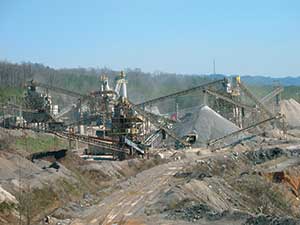Principles to transition a quarry business to its next generation
Family-run businesses seldom make it beyond the third generation of owners.
According to Bill Carpenter, Rogers Group’s director of human resources, only about 30 percent of family-run businesses make it to second-generation ownership. That number diminishes to 12 percent in the third generation and 3 percent in the fourth generation.
“I consider it astonishing when a company makes it to this point,” Carpenter says.
Rogers Group has kept the business in the family for 108 years, reaching a fourth generation of ownership. Carpenter says the company attributes its longevity to several leadership principles it instills in management at its quarries. He shared some of these principles during an educational session at AGG1 Aggregates Academy & Expo in Nashville, Tenn. Below are several principles he says helped his company that might be useful at other operations:
Lead as you like to be led. Ralph Rogers, founder of Rogers Group, often said, “The man in the pit is as important as the man in the office.” Carpenter says Rogers Group aims to treat all employees the same with benefits and policies, regardless of whether an employee is salaried or hourly.
Leaders must show care and concern for their employees. Rogers Group has benefited from taking employee concerns into consideration, providing employees with good benefits packages and taking an interest in how employees families are doing. Carpenter says the company encourages its quarries to host events involving employee family members.
“If you’re running a plant as a plant manager and have a safety luncheon planned, invite the wife or kids to come out with the employee,” he says.
Leaders are stewards of the company and should aim to create a legacy. Creating a legacy doesn’t have to be a lofty ideal. According to Carpenter, a plant manager can create a legacy in the local community by forming good relationships. He suggests getting involved with local volunteer opportunities or supporting the community’s athletic teams.
“What you do locally matters more than what can happen at a corporate level,” he adds. “Consider how you can leave a legacy in the community and how can you leave it better than when you came.”
Leaders must adapt quickly to the economic realities of the times. Leaders of a long-lasting business need to have a “downside plan” on what to do when the market is bad. Carpenter says Rogers Group had a “downside plan” in place before the Great Recession.
“We planned to trim our costs and make sure that burden was shared evenly across the company,” he says. “Through that, we didn’t have to suspend any 401K plans or pay raises. That spoke well to our employees.”
Leaders must find, attract and rehire strong employees. Some companies will refuse to rehire employees who left the company. Carpenter says Rogers Group makes an effort to rehire some of its strong employees who left the company either for career changes or personal reasons. The company calls these people “boomerangs.”
“Things will happen in a person’s life where they might need to leave a job,” Carpenter says. “I don’t think it’s a good idea to refuse to let a good employee come back, especially since I was one of these boomerangs.”
Rogers Group occasionally checks in with good employees who left to see if there’s an opportunity to rehire them. Carpenter says about 20 people in corporate management positions “boomeranged” back to the business, including operations executive Darin Matson.










